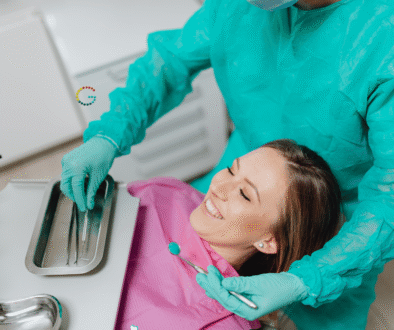Is Your Denture Loose or Broken? Your Guide to Denture Repairs and Relines in Barrie

Restoring Your Comfort, Renewing Your Smile in Barrie.
A well-fitting denture is a key to confidence, proper nutrition, and overall well-being. When that denture becomes loose, cracked, or broken, it’s not merely an inconvenience—it’s a significant disruption to your quality of life. For denture wearers in Barrie, understanding the reasons behind these issues and knowing the safe, professional solutions available is the first step toward restoring comfort and function. This guide serves to demystify the world of denture repairs and relines, explaining why home remedies are dangerous and how professional care can bring your smile back to its best.
Introduction
Imagine you’re out enjoying a beautiful day on Barrie’s waterfront, sharing a meal and a laugh with friends, when you feel that tell-tale slip. Or perhaps you’re at home cleaning your denture when you notice a small, hairline crack that wasn’t there before. A loose or broken denture can be a source of constant worry, embarrassment, and physical discomfort, affecting everything from how you speak to what you can eat. It’s a frustrating experience, and the immediate temptation might be to reach for a tube of super glue or simply try to “live with it.”
However, these are not safe or sustainable solutions. The truth is, changes in your dentures’ fit are a natural and expected part of the denture-wearing journey. Your body changes over time, and your dentures need professional adjustments to keep up. This guide is designed for you, the denture wearer in Barrie. We will walk you through why your denture might be loose or broken, explain the critical differences between professional repairs and relines, and show you why seeking expert care is the best investment you can make in your smile and your health.
- The Primary Culprit: Why Dentures Become Loose
The most common reason a once-perfectly fitting denture becomes loose has less to do with the denture itself and more to do with the natural changes happening in your mouth. This process is called jawbone resorption. After your natural teeth are removed, the jawbone no longer receives the stimulation it needs from the tooth roots. In response, your body begins to gradually break down and resorb the bone tissue, causing your gums and jaw to shrink and change shape over time. Your denture, however, is a fixed shape. As your jaw shrinks, the denture loses its snug fit, leading to looseness, rocking, and instability. This is a gradual but continuous process, which is why periodic adjustments are essential.
- Beyond Bone Loss: Other Causes of a Poor Fit
While jawbone resorption is the main long-term factor, other life changes can also affect how your dentures fit. Significant weight loss or gain can alter the facial tissues and gums that support your denture, leading to a looser fit. The natural aging process also causes changes in the elasticity and shape of your oral tissues. Furthermore, the denture itself can wear down over many years of use. Even minor habits, like clenching or grinding, can put stress on the denture and accelerate wear and tear, contributing to a less-than-perfect fit.
- Telltale Signs: When to Seek a Professional Reline
Your body will give you clear signals when your denture is no longer fitting properly. It’s crucial to listen to these signs and not ignore them, as they can lead to more significant problems if left unaddressed. Key indicators include:
- Increased Use of Adhesives: If you find yourself needing more and more denture adhesive just to keep your teeth in place, it’s a clear sign that the denture is no longer conforming to your gums.
- Sore Spots and Discomfort: A poorly fitting denture can rub against your gums, creating painful pressure points, inflammation, and sores that make wearing it unbearable.
- Trouble Speaking or Eating: You might notice a new lisp, a clicking sound when you talk, or find that your denture shifts uncomfortably when you chew.
- Food Trapped Underneath: When food particles regularly get stuck between your denture and your gums, it means there are gaps where there shouldn’t be, indicating a poor fit.
- The Dangers of DIY: Why Super Glue is a Denture’s Worst Enemy
When a crack appears or a tooth pops off your denture, reaching for a tube of super glue or a home repair kit can seem like a quick, easy fix. This is one of the most dangerous things you can do to your denture and your health. Household glues contain cytotoxic chemicals, like formaldehyde, which are toxic and not meant for oral use. These chemicals can leach out, causing severe tissue irritation, allergic reactions, and other health issues. Furthermore, you will almost certainly fail to align the broken pieces perfectly, creating an improper fit that puts uneven pressure on your jaw, potentially leading to TMJ problems and further bone loss. A DIY repair can also permanently damage the denture’s acrylic, making a professional repair impossible and forcing you to buy a completely new set.
- Professional Denture Repair: Fixing Cracks and Breaks
Unlike toxic household glues, a professional denture laboratory uses biocompatible, safe, and durable acrylics that are specifically designed to bond with your existing denture. Denture practitioners in Barrie can skillfully perform a variety of repairs to restore your denture’s integrity and appearance.
- Repairing Cracks and Fractures: Technicians can seamlessly repair hairline cracks or even full fractures in the pink acrylic base of the denture, restoring its original strength.
- Replacing Broken or Chipped Teeth: If a tooth has chipped or fallen off, it can be professionally replaced with a new, perfectly matched tooth, blending in flawlessly with the rest of your smile.
- Strengthening with Metal Mesh: For patients who are prone to breaking their dentures, a metal mesh can be embedded within the acrylic during the repair process to provide significant extra strength and reinforcement.
- The Ultimate Solution for Looseness: Understanding Denture Relines
A reline is the standard procedure for tightening a loose denture. It doesn’t change the teeth of the denture, but instead reshapes the underside—the part that comes into contact with your gums—to match the current shape of your jaw. This restores the snug, comfortable fit you once had. There are two primary types of relines offered at our Barrie office:
- Hard Reline: This is the most common and durable type of reline. Your practitioner will take a new impression of your gums using your existing denture. This impression is then sent to a lab where the old acrylic on the underside is removed and replaced with a new layer of hard, perfectly moulded acrylic. A hard reline typically lasts for several years and provides a precise, long-lasting fit.
- Soft Reline (or Temporary/Therapeutic Reline): For patients with very sensitive, sore, or tender gums, or for those who have recently had extractions, a hard acrylic might be too uncomfortable. A soft reline uses a pliable, rubbery material to cushion the gums. This material is less durable and needs to be replaced more frequently (often every one to two years), but it provides incredible comfort and relief for sensitive tissues.
- The Reline Process in Barrie: A Step-by-Step Patient Guide
Getting your denture relined at our Barrie clinic is a straightforward process. First, you will have an appointment where we assess the fit of your denture and discuss your needs. If a reline is the right choice, we will take an impression of your gums. For many lab relines, you may need to leave your denture with us for a day. We understand this is an inconvenience, which is why we coordinate to minimize your time without teeth. In some cases, a “chairside” reline can be performed in the office in a single appointment, though lab relines are generally more durable. Once the reline is complete, you’ll return for a final fitting where we make any minor adjustments needed to ensure a perfect, comfortable fit.
- A Deeper Fix: Reline vs. Rebase
While a reline resurfaces the inside of your denture, a rebase is a more extensive procedure. A rebase is recommended when the pink acrylic base of your denture is cracked, weak, or stained, but the teeth themselves are still in good condition. In this process, the entire acrylic base is completely replaced with brand new, high-impact acrylic, while your original teeth are reset in the new base. Think of it as giving your denture a brand new foundation. It’s a more involved process than a reline but less so than getting a completely new denture.
- Knowing When It’s Time for a New Denture
Repairs and relines can significantly extend the life of your dentures, but they are not immortal. On average, a denture should be replaced every 5 to 10 years. There comes a point when a simple adjustment is no longer enough. Signs that you likely need a completely new denture include:
- Worn or Flattened Teeth: The biting surfaces of the teeth have worn down, affecting your ability to chew properly and potentially altering your facial dimensions.
- Multiple Past Repairs: The denture has been fractured and repaired multiple times, compromising its structural integrity.
- Aesthetics: The denture looks stained, old, or unnatural, and you are no longer confident in your smile.
- Major Fit Issues: The denture is so loose that even a reline cannot fully correct the problem, indicating significant changes in your jaw structure.
- Caring for Your Newly Adjusted Denture
Once your denture has been professionally repaired or relined, it’s important to care for it properly to maintain its fit and longevity. Always remove your denture at night to give your gums a rest. Clean it daily with a soft brush and a non-abrasive denture cleanser—never use regular toothpaste, which is too abrasive. Soak your denture overnight in water or a denture solution to keep it from drying out and warping. Continue to attend your regular dental check-ups in Barrie so your practitioner can monitor the fit of your denture and the health of your mouth.
Frequently Asked Questions
-
A1: The most common reason is a natural process called jawbone resorption. After teeth are removed, the jawbone gradually shrinks and changes shape over time, causing your denture to lose its snug fit.
Conclusion
A loose or broken denture is more than a simple inconvenience; it is a clear signal from your body that it’s time for professional attention. While the temptation to use a quick DIY fix is strong, doing so risks your health and can cause irreversible damage. Professional denture repairs and relines are safe, effective, and essential procedures for maintaining your oral health, comfort, and confidence.
By understanding why these changes happen and what solutions are available, you can take proactive steps to care for your smile. Whether you need a simple repair for a chipped tooth or a full reline to restore a snug fit, our Barrie team is here to provide the expert care you need. Don’t “live with” the discomfort and embarrassment any longer; a comfortable, secure smile is within reach.
Let Us Help You Smile Confidently Again
If your denture is loose, broken, or causing you discomfort, don’t wait. Contact our Barrie office today to schedule an assessment. We are here to provide the professional, compassionate care you deserve.
- Name: A Dental Office
- Address: 181 Livingstone St. East, Suite 8, Barrie, ON, L4M 6Z4 Canada
- Phone: 705 726 3567
- Email: admin@adentaloffice.com
- Website: www.adentaloffice.ca



